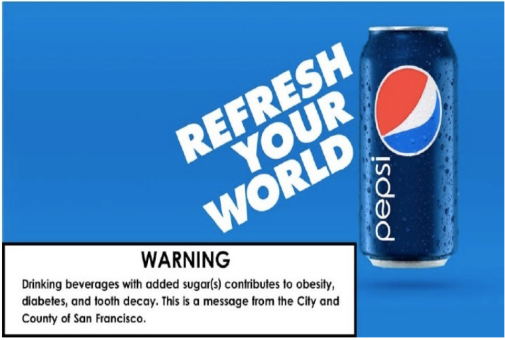San Francisco requires that ads for sugar-sweetened beverages (e.g., soda, pop, whatever you call it) carry a message stating, “Warning: Drinking beverages with added sugar(s) contributes to obesity, diabetes, and tooth decay. This is a message from the City and County of San Francisco.” The message must take up 20% of the ad and be outlined by a rectangular border, separating it from the intended message. The purpose of the message is to “inform the public of the presence of added sugars and thus promote informed consumer choice that may result in reduced caloric intake and improved diet and health.”

The American Beverage Association took issue with San Francisco’s requirement and filed for a preliminary injunction, arguing that the city’s requirement unconstitutionally chilled First Amendment protected speech. But the district court denied the injunction. On appeal, the Ninth Circuit reversed.
The Court articulated what criteria that a requirement like San Francisco’s must meet to pass constitutional muster. These criteria include being wholly factual and uncontroversial, being true, and not causing an undue burden on the advertiser. The Court found that San Francisco’s warning label was misleading (therefore untrue) and controversial because it unnecessarily singled out beverages from other sugar-added products (like candy bars). Moreover, the required message appears to state that any amount of consumption of these beverages is unhealthy—contradicting the FDA and not accounting for behavioral contributions. In addition, the Court found that the size of the label imposes an undue burden on the advertisers and imposes an antagonistic message—chilling the Association’s protected speech.
Case: Am. Beverage Ass’n v. City & Cty. of San Francisco, Nos. 16-16072 & 16-16073 (9th Cir. Sept. 19, 2017) (opinion here)